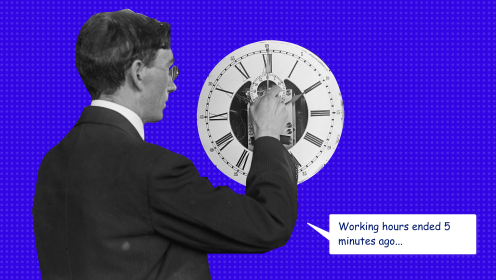About time management
Time management literally translates as "time management". It's clear that you're not the Flash or Doctor Manhattan — you can hardly manage time (although you would like to). But it is quite possible to manage it as effectively as possible.
The main principles of time management are formed on the basis of four components:
- time control,
- time optimization,
- planning a day / week/month,
- creating motivation.
Let's figure it out.
Principle 1. Plan ahead
Planning is cool. When you have a detailed plan, you don't need to keep everything in mind, which means you can achieve high efficiency.
Как всё это работает:
- the plan consists of a sequence of actions;
- each action brings a certain result;
- results help you get ahead in achieving your goal.
Depending on the depth of planning, there are three types of goals:
- tactical (from 1 day to 3 months),
- strategic (from 3 months to a year),
- general vector (for several years).
The general vector dictates strategic goals, which in turn determine tactics for short periods of time: a day, a week, or a month. When you start working on a plan, start with global goals and move to small ones, constantly asking yourself the question: "What do I need for this?"
Example
I want to upgrade my English level, save up for the initial mortgage payment and do frontend development. These are my vectors for the coming years. Yes, that's right, because working in one direction is not so productive — life is very limited.
To improve my English and frontend skills, I need to take courses and practice more. To save up for a down payment, I need to save about 30,000 a month, which means I can earn more. These are my strategic goals for the year.
English courses and frontend development will give me a lot of tactical goals: from learning some rules of English grammar to mastering the principles of programming in JS. To earn more, I need to find an additional job or ask for a raise — in any case, I may need to acquire some additional competencies.
You can already work with this.
Constantly fix how and what you spend time on. Then you can make plans based on real data. Various time tracking apps will help you fix everything.
Don't plan more than 10 tasks per day, take just as many as you can actually do. Divide large tasks into small ones.
Principle 2. Aim for a specific result
The results of your actions lead to the achievement of goals. This means that you need to plan every working day so that there are no tasks (and therefore results) that are not consistent with your goals.
You can use SMART system for verification. All your actions should:
- be specific (Specific),
- be measurable (Measurable),
- have a performer (Assignable),
- be feasible (Realistic),
- have a specific time frame for implementation (Timebound).
The main criteria for the usefulness of a task is its specificity. Do you understand what specific actions and in what order will lead to the achievement of the result? The result should be measurable — it will be easier to distribute the time budget.
Example
"Check mail" is not a specific or measurable task.
"Compose 5 response letters for clients and send them by mail" is specific and measurable.
The main general criteria of productivity is always to move towards the goal by completing tasks of varying degrees of complexity.
Principle 3. Set your priorities
When the overall action plan is ready, you need to decide which actions to perform first. There are many ways to set priorities. I use two: the AB principle and The Eisenhower Matrix.
ABC-principle
Evaluate each goal and task in terms of return on your investment: time, effort and finances. You will get three task groups:
| Type | Concrete action |
|---|---|
| Important stuff (А) | Crisis management, major projects |
| Less important stuff (B) | Minor, but important projects, operational instructions from management |
| Unimportant stuff (C) |
The most important tasks are 15% of the total number of tasks. The contribution of such tasks to achieving the goal is about 65%, so it is better to deal with them yourself and immediately.
Important tasks — 20% of the total. Their significance for achieving the goal is about 20%. With these tasks, you need to decide whether to delegate them or not — it all depends on the importance of the final goal and the competence of colleagues.
Attention!
Don't allow issues to “flow" from one category to another. This is a sign that you simply do not have time to fulfill them or set priorities incorrectly.
Operational tasks account for 65% of the total. At the same time, their significance is only 15%. It is advisable to delegate such tasks immediately.
The Eisenhower Matrix
It is suitable for rapid analysis and quick decision-making on prioritization.
Principle 4. Focus on the main thing, delegate the rest
If it is better to pass the task on to someone in terms of money and time, then you must do it. Simply put, the more "expensive" your time is, the fewer secondary tasks you should have on your schedule.
Example
You can create a summary table of potential contractors ' offers yourself, but it is better to entrust it to someone else. In terms of results, this is not the most important task.
Identify the hours when it is easiest for you to concentrate and schedule the most resource-intensive work for this time. Perform less important tasks for the rest of the day. You can also respond to emails in the evening.
Learn how to say "no" to distractions, any business and people, who are wasting your time.
Principle 5. Visualize plans and tasks
Visualizing information helps you organize everything in your head. Including plans and tasks. There are many ways to do this: from an intelligence map to a Gantt chart.
Example
To renovate the apartment, I need to: prepare a project, buy the necessary materials, make repairs in the room, make repairs in the kitchen, organize a housewarming party. All this can be very clearly represented in the form of a Gantt chart.
This way you can immediately see which processes are running sequentially, and which can be run in parallel or delegated to better plan your financial and time budget.
Principle 6. Analyze, optimize and rest
Get into the habit of looking back and analyzing the effectiveness of personal time management. Pay special attention to situations where everything went wrong: you spent too many resources, set the wrong priority, and so on.
Figure out how to solve such situations in the future. If you feel that you are losing control — take a short break and re-focus on your own actions. Come up with your own rules and principles of time management, taking into account the peculiarities of your personality and workflow.
Don't forget to rest. Include rest periods in your plan for the day and week. You can only remain effective at the peak of your activity, so if you don't rest, don't expect outstanding results from yourself.
In short, effective time management will help free up a huge amount of resources for a full-fledged work and personal life. Use the time management principles I described above and soon there will be one less cause for stress. You need to live and work in pleasure.


















